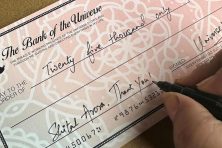Make The Most Of Extra Cash With These Smart Financial Moves

Leaving too much money in your checking account can feel secure—but it could be holding you back financially. Cash that just sits there loses value over time, especially as inflation outpaces the minimal interest most checking accounts offer. Instead, put your money to work with these smart, practical financial strategies.
Move Most Of It To A High-Yield Savings Account

Keeping large sums in checking earns you next to nothing. High-yield savings accounts from online banks can offer 4.00% APY or higher. Transferring $60,000 to one could earn over $2,400 in passive income annually. Ally and SoFi regularly offer competitive rates and FDIC insurance up to $250,000.
More From The Penny Hoarder: The Dumbest Things We Keep Spending Too Much Money On
Eliminate High-Interest Credit Card Debt Immediately

Even if you have the cash, many people carry balances that rack up 20 %+ APR. Paying those off first is a guaranteed return, far better than investing. Clearing a $10,000 credit card balance at 22% interest saves $2,200 a year, the equivalent of a high-risk investment without the risk.
Make money easier. Sign up for The Penny Hoarder’s newsletter today.
Max Out Your Roth IRA Contributions For The Year

A Roth IRA allows post-tax money to grow tax-free. In 2025, the contribution limit is $7,000 if you’re under 50. Investing that in a low-fee index fund with an average 7% return could grow to over $50,000 in 25 years, completely tax-free at withdrawal.
More From The Penny Hoarder: If You Have More Than $1,000 in Your Checking Account, Make These Money Moves
Create A Six-Month Emergency Fund

Life happens—jobs are lost, roofs leak, engines fail. A proper emergency fund helps you avoid panic spending or debt spirals. Based on the median U.S. household expenses of $77,280 annually, setting aside $38,640 ensures coverage for six months of housing, groceries, insurance and utilities without touching investments.
More From The Penny Hoarder: The Best Rewards Credit Cards to Maximize Your Spending in 2025
Open A Brokerage Account And Diversify

Letting money sit erodes its buying power. A taxable brokerage account enables flexible investing in stocks or real estate investment trusts (REITs). Investing $10,000 in a broad-market ETF like VTI or SCHD historically returns 10–12% annually, potentially growing to over $25,000 in ten years, assuming no retirement account restrictions.
More From The Penny Hoarder: Our Picks for The Best Bank Promotions This Month
Try A Health Savings Account (HSA)

HSAs are tax-friendly: money you put in is deductible, it grows without tax, and using it for healthcare means no taxes when you take it out. If you’re enrolled in a high-deductible health plan, it’s a no-brainer. You can contribute up to $4,300 individually or $8,550 for a family while investing the funds for growth.
More From The Penny Hoarder: Budgeting 101: How to Budget Money
Prepay Your Mortgage Or Refinance Strategically

Reducing your loan principal ahead of schedule can slash interest costs over the mortgage’s life. A $15,000 lump-sum payment on a $250,000 loan at 6.8% could save nearly $40,000 in interest and reduce the term by several years. Alternatively, refinancing to a lower rate can free up monthly cash.
More From The Penny Hoarder: Our Picks for The Best Budget Apps for Couples
Invest In Short-Term Treasury Bills

If you’re wary of stock volatility, Treasury bills offer safety with better yields than many savings accounts. As of mid-2025, 6-month T-bills are yielding around 4.17%. Buying $25,000 worth directly through TreasuryDirect gives you government-backed security and a return of over $650 in just half a year.
More From The Penny Hoarder: 5 Strategies to Consolidate Your Credit Card Debt
Give Your Home An Energy-Efficient Upgrade

Smart upgrades aren’t just environmentally friendly—they’re financially savvy. Replacing an old HVAC system or installing solar panels can slash utility bills and may qualify for federal tax credits up to 30% of the cost. The Inflation Reduction Act made these upgrades even more financially beneficial in 2025.
More From The Penny Hoarder: What is Debt Settlement and How Does it Work?
Stagger CDs With A Laddering Strategy

Rather than locking in a lump sum for years, split it across multiple certificates of deposit with varying terms. For example, divide $30,000 into 1-, 2- and 3-year CDs. As each matures, reinvest at current rates. This approach improves liquidity while taking advantage of rising interest rates.
More From The Penny Hoarder: Ditch Overpriced Car Insurance Now — Save $500 Today
Start A 529 Plan For Future Education Costs

College tuition continues to soar, and a 529 plan offers tax-free growth for qualified expenses. You don’t need kids now to open one—plans can later be transferred to a child, niece or even yourself. Contributing $10,000 now could grow to over $24,700 in 10 years at a 9.5% return.
More From The Penny Hoarder: Here’s How to Start Saving Money — Even If You Don’t Have Room in Your Budget
Meet With A Fee-Only Fiduciary Advisor

A one-time consult with a fiduciary ensures unbiased advice—they’re legally obligated to act in your best interest. Many offer flat-rate packages or hourly sessions. For around $300–$600, you can walk away with a custom strategy for your cash, investments, taxes and insurance, tailored to your specific goals and risk tolerance.
More From The Penny Hoarder: The 28 Best Side Hustles: Our Top Picks to Help You Make More Money
Diversify With Alternatives Like REITs Or Precious Metals

Traditional portfolios aren’t your only option. REITs (Real Estate Investment Trusts) will expose you to real estate with quarterly dividends, while gold ETFs like GLD provide an inflation hedge. Allocating even $5,000 across alternatives can reduce overall volatility and improve long-term stability when stocks and bonds are moving in sync.
More From The Penny Hoarder: 17 Make-Your-Own-Schedule Jobs You Can Do From Home
Take Advantage Of FDIC-Insured Sweep Accounts

Cash management accounts offered by brokerages like Fidelity and Charles Schwab often “sweep” funds into multiple FDIC-insured banks to cover more than the standard $250,000 limit. These accounts can also earn interest at a rate of 2.72%. Keeping $10,000 parked there adds liquidity without sacrificing yield or insurance protection.
More From The Penny Hoarder: These Companies Will Give You Food and Other Products For Free (Yes, Really)
Automate Charitable Giving For Maximum Tax Impact

Giving strategically can be as beneficial to your finances as it is to your community. Donor-Advised Funds (DAFs) let you donate appreciated assets and take an immediate deduction. Donating $5,000 in stock with a $3,500 cost basis could save you over $400 in taxes.
More From The Penny Hoarder: Smarten Up, Americans. No Offense But Millions of Us Haven’t Used These Money Secrets












